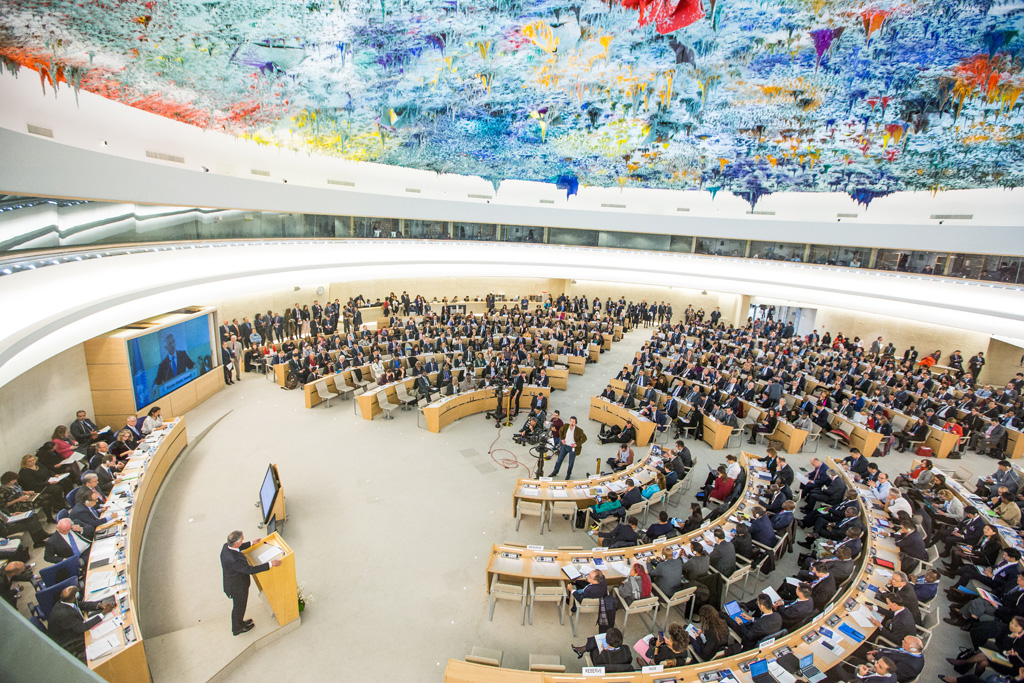Increasingly severe restrictions on civic space and fundamental freedoms: UN hosts interactive dialogue on Belarus
The human rights situation in Belarus has continued to worsen in 2021, Michelle Bachelet, UN High Commissioner for Human Rights, said in her statement as part of an Interactive Dialogue on the interim oral update of OHCHR on the situation of human rights in Belarus within the 48th session of the Human Rights Council.
“I am deeply concerned by increasingly severe restrictions on civic space and fundamental freedoms, including continuing patterns of police raids against civil society organizations and independent media, and the arrests and criminal prosecutions of human rights activists and journalists on what routinely appear to be politically motivated charges.
Over 650 individuals in Belarus are now believed to be imprisoned because of their opinions – among them, members of the opposition, human rights defenders, journalists, protesters and activists, including the chair of well-known human rights group Viasna,” Ms. Bachelet said.
The UN human rights chief also stressed that by the end of August 2021, 129 civil society organizations had been closed down or were in the process of liquidation by the authorities, including several long-standing partners of the UN human rights mechanisms.
“I am alarmed by persistent allegations of widespread and systematic torture and ill-treatment in the context of arbitrary arrests and detention of protesters. We have no evidence to date of any genuine and impartial investigations has taken place into reports of incidents that took place during the dispersal of demonstrations in the days following 9 August 2020,” she said.
The interactive dialogue was attended by representatives of 46 countries and a number of international human rights organizations, which raised issues of repression against human rights defenders, journalists, opposition and civil society activists, torture and arbitrary detention, liquidation of many NGOs over the past 12 months, and the lengthy prison terms handed down in politically motivated criminal trials, including against Maryia Kalesnikava and Maksim Znak, the forced landing of a Ryanair plane and the detention of Raman Pratasevich and Sofiya Sapega, the migration crisis on the Belarusian border with Lithuania, Latvia and Poland.
Representatives of European countries called for the release of all political prisoners and an end to repression, for transparent investigations at the national level, so that all perpetrators could be brought to justice, for an inclusive dialogue between the authorities and civil society, and for cooperation with all UN special procedures and OHCHR experts.
Traditionally, a number of countries, including Egypt, Venezuela, Cuba, the Russian Federation, China, Syria, Lebanon, Tajikistan, Azerbaijan and others, condemned the ‘politicization’ of the Council’s actions and the fact that this interactive dialogue is conducted without Belarus’s consent. They also criticized the Council’s decision to investigate human rights violations in Belarus as ‘infringement’ on the country's sovereignty.
Several key non-governmental organizations, including Right Livelihood Foundation, Human Rights House Foundation, International Bar Association, International Federation for Human Rights (FIDH) and PEN America expressed support for OHCHR and urged the UN body to continue documenting human rights violations. They also called for the immediate release of political prisoners in Belarus, including the imprisoned leaders and volunteers of Viasna.
A representative of Right Livelihood said in her speech:
“As of September 20, 2021, Belarus counts 674 political prisoners. That is 148 more since we last addressed the Council. Such numbers are not only likely to continue to increase, but might soon become unavailable to us, as the Lukashenka regime persists in its attempt to wipe out Belarusian civil society.
Right Livelihood Laureate Human Rights Center “Viasna” has been playing a leading role in advocating for democracy and the rule of laws in Belarus, documenting human rights abuses for the past 25 years. To date, seven of its members, Ales Bialiatski, Valiantsin Stefanovic, Uladzimir Labkovic, Marfa Rabkova, Tatsiana Lasitsa, Andrei Chapiuk and Leanid Sudalenka, are arbitrarily detained. Seven others are suspects in the same case, and several more were forced to leave the country.”
Yury Ambrazevich, Belarus’s permanent representative to the UN, argued that the situation in the country stabilized, and the Council should not interfere in its internal affairs.
Finally, Michelle Bachelet answered questions from EU envoys on what could be done to improve the human rights situation in Belarus, noting that the three appointed experts have already done all the preparatory work and will soon start their investigation in close cooperation with victims of torture and representatives of civil society. She once again called on the Belarusian side to transparently cooperate with UN procedures.


















